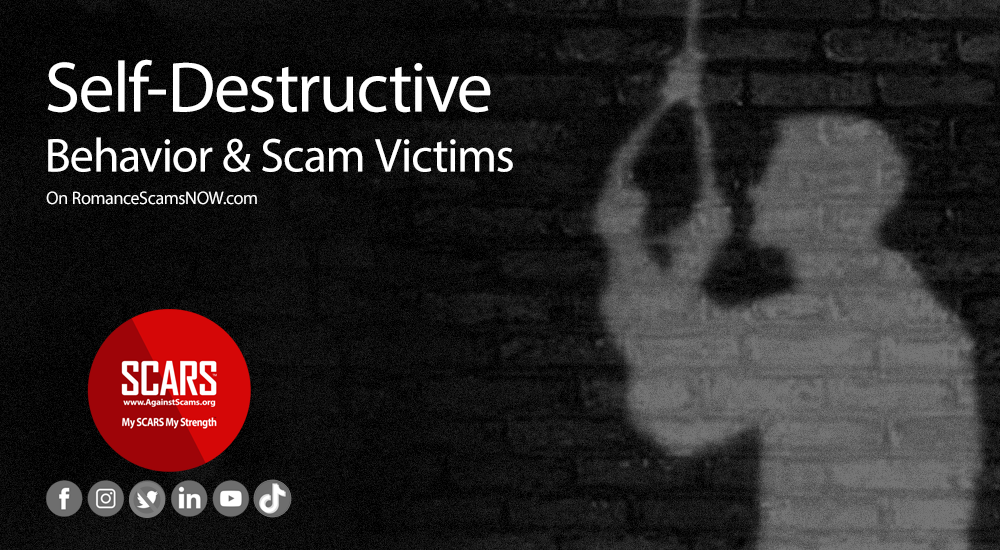
SCARS Institute’s Encyclopedia of Scams™ Published Continuously for 25 Years

After The Scam – Victims Frequently Engage In Self-Defeating Behaviors
Psychology of Scams
A SCARS Insight
Self-Destructive Behavior & Scam Victims
After the scam, how you view yourself is important!
After the scam ends and you discover the truth, you are in a state of shock! You don’t know what to do, but you have to do something or you will explode!
But it seems like everything you do only makes things worse!
Do you feel like every time you take a step forward you take a few steps back? Do find yourself engaging in self-sabotaging behaviors? Do you have negative thoughts about yourself or your ability to reach your goals? Do you continue to engage in unhealthy habits even though you KNOW they are keeping you from growing?
Self-destructive behaviors can take many different forms, and not only do they harm the person performing them, but they also have the potential to hurt those around them.
Self-Defeating Behaviors
Self-defeating behaviors are behaviors that move you away from the goals that you have set for yourself. These behaviors are distracting and self-sabotaging and cause us to feel exhausted and bad about ourselves.
Theories suggest that self-defeating behaviors are a kind of defense mechanism, fooling people into thinking that they are coping with stress, pressure, social demands, etc., while others suggest that self-defeating behaviors help a person to stay within their comfort zone (e.g., if someone feels a lack of self-confidence, they may sabotage a job opportunity to remain at a certain career level).
Scam victims often sabotage their emotional recovery because they feel like they need to remain angry, they need to get revenge!
Some people feel as though these behaviors are impossible to resist.
Common types of self-defeating behaviors include:
- Physical/mental neglect
- Self-criticism
- Perfectionism
- Self-pity
- Procrastination
- Comparing yourself to others
- Social withdrawal/alienation
- Risky sexual behaviors
- Refusing help or hostility to those that try to help
- Over-spending on fruitless services
- Relationship sabotage
- Over/Undereating
- Self-injurious behaviors
- Drug and alcohol abuse/self-medication
- Obsessive focus on what harmed them
- Staying angry and enraged
- Looking for revenge & vengeance
What Causes It
What Causes Self-Sabotaging Behavior?
Just as self-destructive behaviors are diverse, there is no single cause of these acts. However, there are theories as to why they may occur.
Many self-defeating behaviors can be attributed to experiences of trauma or loss, such as the romance scam a victim experiences. These may include events like experiencing a violent crime, the death of a loved one, or divorce, but more simply put, these behaviors often correlate with someone’s sense of self-worth being damaged, for example when they have been exposed to abuse.
Adults who engage in self-destructive acts many times have histories of childhood trauma, which can include sexual, physical, and verbal abuse as well as parental neglect. Studies show that these types of traumatic experiences are significant predictors of physical self-harm.
Trauma can also cause people to self-medicate with drugs, alcohol, and tobacco products, which can be used to escape emotional pain or to feel good.
However, what was once a way to provide self-comfort may eventually become an addiction, and over time, substances will be used to manage withdrawal symptoms rather than for pleasure and relief. Many people struggle with withdrawal symptoms, which keep them in a vicious cycle of substance use, despite knowing the consequences of their actions.
Additionally, some people may engage in self-sabotaging behaviors because they feel insecure. For example, someone might believe that they are overweight, and they may starve themselves or binge and purge in an effort to lose weight (as seen in eating disorders such as anorexia nervosa and bulimia). Often the results are drastic and excessive, and eating disorders can cause malnourishment and other health problems. A romance scam is very capable of leaving victims feeling insecure.
Some Traits And Indicators Of Self-Destructive Behavior
There are a number of traits associated with self-destructive behavior, as well as signs that a person may be engaging in it. Some are obvious, while others are more subtle.
- Depression, Apathy, And Pessimistic Beliefs
- Impulsive Behavior And Lack Of Self-Control
- Neglecting Responsibilities
- Sabotaging Relationships
- Martyrdom, Self-Sacrifice, And Victim Mentality
- Emotional Sensitivity
How To Counter Self-Destructive Behaviors
What can you do if you feel as though you are engaging in self-destructive behaviors?
- Start by identifying the behaviors in your life that you feel are getting in the way of reaching your goals. Insight is an integral part of changing your behavior.
- Get real. Find ways to stop minimizing these unhealthy behaviors and rationalizing their presence. Examine how a behavior really impacts your life.
- Don’t get down on yourself. Being overly critical of yourself or thinking that you are “weak” creates a worse self-concept, often leading to lower self-esteem and confidence.
- Make it harder to act impulsively. Do you find that you overeat when you are stressed? Keep foods that you tend to binge on out of the house. Do you overspend when you are sad? Only withdraw enough cash for your weekly expenses and make access to your debit/credit cards more difficult.
- Practice mindfulness. Focusing on the present can help you to more readily identify your emotions and the behaviors that are getting in the way of your goals.
- Start to self-reflect. Journaling or keeping a daily log of healthy habits can be a great way to build positive patterns of behavior.
- Seek professional help. Meeting with a counselor or psychologist can be an important part of reducing unhealthy behaviors. A psychologist can help you to identify triggers that lead to your self-defeating behaviors and provide tools to help you replace them with healthier options.
Self-defeating behaviors can have a variety of causes and can therefore be helped by multiple treatment methods.
Therapy is generally recommended for people who have self-destructive tendencies because rather than simply managing symptoms, it can get to the root of the feelings of shame and guilt that are likely to have caused the harmful behaviors in the first place. A therapist can also help change the way you feel about your life, which is a core part of modalities like cognitive behavioral therapy (CBT).
You can find qualified trauma therapists here: https://www.psychologytoday.com/us/therapists/trauma-and-ptsd
-/ 30 /-
What do you think about this?
Please share your thoughts in a comment below!
LEAVE A COMMENT?
Thank you for your comment. You may receive an email to follow up. We never share your data with marketers.
Recent Comments
On Other Articles
- on Love Bombing And How Romance Scam Victims Are Forced To Feel: “I was love bombed to the point that I would do just about anything for the scammer(s). I was told…” Feb 11, 14:24
- on Dani Daniels (Kira Lee Orsag): Another Scammer’s Favorite: “You provide a valuable service! I wish more people knew about it!” Feb 10, 15:05
- on Danielle Delaunay/Danielle Genevieve – Stolen Identity/Stolen Photos – Impersonation Victim UPDATED 2024: “We highly recommend that you simply turn away form the scam and scammers, and focus on the development of a…” Feb 4, 19:47
- on The Art Of Deception: The Fundamental Principals Of Successful Deceptions – 2024: “I experienced many of the deceptive tactics that romance scammers use. I was told various stories of hardship and why…” Feb 4, 15:27
- on Danielle Delaunay/Danielle Genevieve – Stolen Identity/Stolen Photos – Impersonation Victim UPDATED 2024: “Yes, I’m in that exact situation also. “Danielle” has seriously scammed me for 3 years now. “She” (he) doesn’t know…” Feb 4, 14:58
- on An Essay on Justice and Money Recovery – 2026: “you are so right I accidentally clicked on online justice I signed an agreement for 12k upfront but cd only…” Feb 3, 08:16
- on The SCARS Institute Top 50 Celebrity Impersonation Scams – 2025: “Quora has had visits from scammers pretending to be Keanu Reeves and Paul McCartney in 2025 and 2026.” Jan 27, 17:45
- on Scam Victims Should Limit Their Exposure To Scam News & Scammer Photos: “I used to look at scammers photos all the time; however, I don’t feel the need to do it anymore.…” Jan 26, 23:19
- on After A Scam, No One Can Tell You How You Will React: “This article was very informative, my scams happened 5 years ago; however, l do remember several of those emotions and/or…” Jan 23, 17:17
- on Situational Awareness and How Trauma Makes Scam Victims Less Safe – 2024: “I need to be more observant and I am practicing situational awareness. I’m saving this article to remind me of…” Jan 21, 22:55
ARTICLE META
Important Information for New Scam Victims
- Please visit www.ScamVictimsSupport.org – a SCARS Website for New Scam Victims & Sextortion Victims
- Enroll in FREE SCARS Scam Survivor’s School now at www.SCARSeducation.org
- Please visit www.ScamPsychology.org – to more fully understand the psychological concepts involved in scams and scam victim recovery
If you are looking for local trauma counselors please visit counseling.AgainstScams.org or join SCARS for our counseling/therapy benefit: membership.AgainstScams.org
If you need to speak with someone now, you can dial 988 or find phone numbers for crisis hotlines all around the world here: www.opencounseling.com/suicide-hotlines
A Note About Labeling!
We often use the term ‘scam victim’ in our articles, but this is a convenience to help those searching for information in search engines like Google. It is just a convenience and has no deeper meaning. If you have come through such an experience, YOU are a Survivor! It was not your fault. You are not alone! Axios!
A Question of Trust
At the SCARS Institute, we invite you to do your own research on the topics we speak about and publish, Our team investigates the subject being discussed, especially when it comes to understanding the scam victims-survivors experience. You can do Google searches but in many cases, you will have to wade through scientific papers and studies. However, remember that biases and perspectives matter and influence the outcome. Regardless, we encourage you to explore these topics as thoroughly as you can for your own awareness.
Statement About Victim Blaming
SCARS Institute articles examine different aspects of the scam victim experience, as well as those who may have been secondary victims. This work focuses on understanding victimization through the science of victimology, including common psychological and behavioral responses. The purpose is to help victims and survivors understand why these crimes occurred, reduce shame and self-blame, strengthen recovery programs and victim opportunities, and lower the risk of future victimization.
At times, these discussions may sound uncomfortable, overwhelming, or may be mistaken for blame. They are not. Scam victims are never blamed. Our goal is to explain the mechanisms of deception and the human responses that scammers exploit, and the processes that occur after the scam ends, so victims can better understand what happened to them and why it felt convincing at the time, and what the path looks like going forward.
Articles that address the psychology, neurology, physiology, and other characteristics of scams and the victim experience recognize that all people share cognitive and emotional traits that can be manipulated under the right conditions. These characteristics are not flaws. They are normal human functions that criminals deliberately exploit. Victims typically have little awareness of these mechanisms while a scam is unfolding and a very limited ability to control them. Awareness often comes only after the harm has occurred.
By explaining these processes, these articles help victims make sense of their experiences, understand common post-scam reactions, and identify ways to protect themselves moving forward. This knowledge supports recovery by replacing confusion and self-blame with clarity, context, and self-compassion.
Additional educational material on these topics is available at ScamPsychology.org – ScamsNOW.com and other SCARS Institute websites.
Psychology Disclaimer:
All articles about psychology and the human brain on this website are for information & education only
The information provided in this article is intended for educational and self-help purposes only and should not be construed as a substitute for professional therapy or counseling.
While any self-help techniques outlined herein may be beneficial for scam victims seeking to recover from their experience and move towards recovery, it is important to consult with a qualified mental health professional before initiating any course of action. Each individual’s experience and needs are unique, and what works for one person may not be suitable for another.
Additionally, any approach may not be appropriate for individuals with certain pre-existing mental health conditions or trauma histories. It is advisable to seek guidance from a licensed therapist or counselor who can provide personalized support, guidance, and treatment tailored to your specific needs.
If you are experiencing significant distress or emotional difficulties related to a scam or other traumatic event, please consult your doctor or mental health provider for appropriate care and support.
Also read our SCARS Institute Statement about Professional Care for Scam Victims – click here to go to our ScamsNOW.com website.










![Financial Recovery - Avoid Money Triggers - Perspective on Money for Scam Victims - 2023 [UPDATED 2025] Financial Recovery Money Triggers Financial Recovery - Avoid Money Triggers - Perspective on Money for Scam Victims - 2023 [UPDAYED 2025] - on the SCARS Institute RomanceScamsNOW.com - the Encyclopedia of Scams™](https://romancescamsnow.com/wp-content/uploads/2025/06/Financial-Recovery-Money-Triggers.png)
![Married Scam Victims: Rebuilding Trust in a Marriage Following a Romance Scam - [UPDATED 2025] Married Scam Victims 2025 Married Scam Victims: Rebuilding Trust in a Marriage Following a Romance Scam - [UPDATED 2025] - on the SCARS Institute RomanceScamsNOW.com - the Encyclopedia of Scams™](https://romancescamsnow.com/wp-content/uploads/2021/04/Married-Scam-Victims-2025.png)




Thank you for this article! I have always been my worst critic. Then it all just spirals down into self comparison, emotional sensitivity, perfectionism, self pity and more. I know that most of this comes from things that happened in my childhood. My parents were codependent, my mother had self esteem issues and vanity, my dad was abused as a child. My parents did not have good parental role models when they were growing up. They tried their best but their parenting often was demoralizing. I have suffered with it most of my life. Then I married my first husband who over the years became more physically, verbally and mentally abusive. Everything about me and how I think of myself has been attacked over the years. The steps to counteract self defeating behaviors are very helpful.
Childhood traumas are definitely affecting individuals and those self-defeating behaviors are the proof of that.
A self defeating thought that I have often is what I could have done with all the money I lost as well as what I could have bought with the new loan I now make monthly payments on.